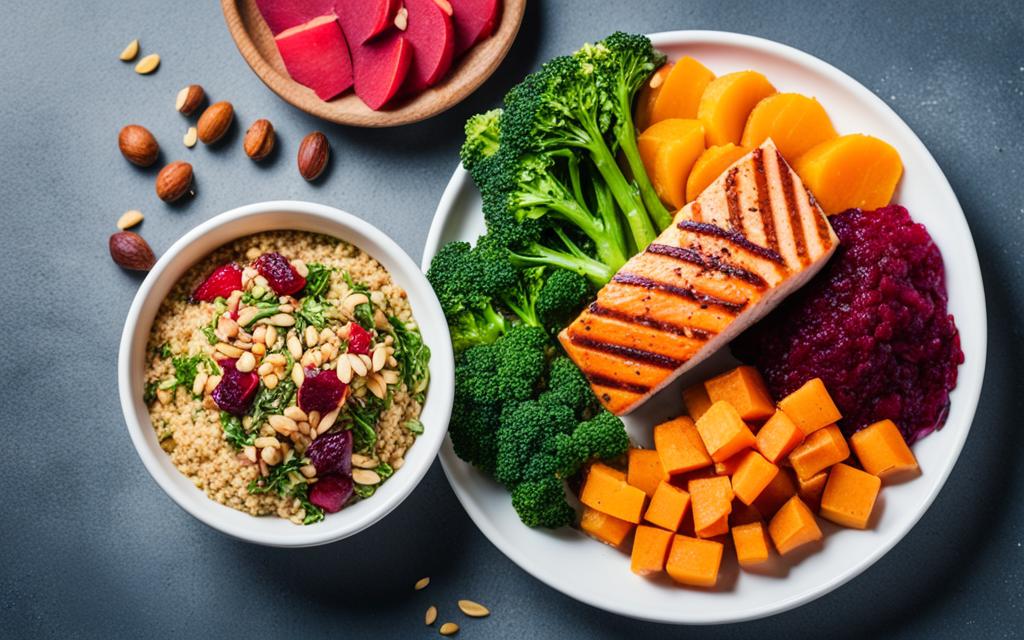Hemoglobin is a crucial component of our blood, responsible for carrying oxygen throughout the body. Maintaining healthy hemoglobin levels is essential for your overall well-being. In this article, we’ll explore the top nutrient-rich foods that can help increase your hemoglobin levels and improve your health.
Whether you’re looking to boost your best foods to boost hemoglobin or incorporate more nutrient-rich recipes to increase hemoglobin into your diet, we’ve got you covered. By understanding the importance of hemoglobin and incorporating the right food to increase hemoglobin, you can take steps towards optimal health and well-being.
Understanding the Importance of Hemoglobin
Hemoglobin is a crucial protein found in your red blood cells that is responsible for carrying oxygen from your lungs to the rest of your body’s tissues. This essential function is vital for a variety of bodily processes, including energy production, cognitive function, and maintaining a healthy immune system. A deficiency in hemoglobin, known as anemia, can lead to symptoms such as fatigue, weakness, dizziness, and shortness of breath.
The Importance of Hemoglobin lies in its ability to transport oxygen effectively throughout your body. Hemoglobin is the primary carrier of oxygen, and its levels directly impact your overall well-being. Maintaining Healthy Hemoglobin Levels is crucial for optimal physical and mental performance, as well as supporting your immune system.
Understanding the Hemoglobin Function and its significance in your body can help you take the necessary steps to ensure your hemoglobin levels remain within a healthy range. A Hemoglobin Deficiency can have far-reaching consequences, so it’s important to be proactive in addressing any potential issues and maintaining your hemoglobin levels through a balanced, nutrient-rich diet.
Iron-Rich Foods to Boost Hemoglobin
Achieving optimal hemoglobin levels is crucial for your overall health, and incorporating iron-rich foods into your diet is one of the best ways to do so. Iron is a key component of the hemoglobin molecule, responsible for carrying oxygen throughout your body. By focusing on hemoglobin boosting foods, you can naturally support your body’s ability to produce and maintain healthy levels of this vital protein.
Some of the top iron-rich foods that can help increase your hemoglobin levels include red meat, spinach, lentils, cashews, and quinoa. These nutrient-dense options not only provide a rich source of iron but also offer a variety of other essential vitamins and minerals that support your overall well-being.
| Food | Iron Content (per serving) |
|---|---|
| Beef (3 oz) | 2.7 mg |
| Spinach (1 cup, cooked) | 6.4 mg |
| Lentils (1 cup, cooked) | 6.6 mg |
| Cashews (1 oz) | 1.9 mg |
| Quinoa (1 cup, cooked) | 2.8 mg |
Incorporating these best foods for hemoglobin into your daily meals and snacks can help ensure your body has the necessary iron to support healthy hemoglobin production and transport. Remember, a balanced and nutrient-rich diet is key to maintaining optimal blood health and overall well-being.
Vitamin C-Rich Foods for Better Iron Absorption
While iron is essential for hemoglobin production, the body’s ability to absorb iron can be significantly enhanced by the presence of vitamin C. Incorporating vitamin C-rich foods into your diet can optimize the utilization of the iron you consume, leading to increased hemoglobin levels and improved overall health.
Some of the best vitamin C-rich foods include citrus fruits like oranges, lemons, and grapefruits, as well as bell peppers, broccoli, strawberries, and tomatoes. These nutrient-dense options not only provide a potent source of vitamin C but also contain other beneficial compounds that support the body’s ability to absorb and utilize iron effectively.
By pairing iron-rich foods with vitamin C-rich foods, you can create a powerful synergy that boosts your body’s hemoglobin production. This strategy can be particularly helpful for individuals who may be experiencing iron deficiency or struggling to maintain healthy hemoglobin levels.
| Vitamin C-Rich Foods | Iron Content (per serving) | Vitamin C Content (per serving) |
|---|---|---|
| Orange | 0.1 mg | 70 mg |
| Red Bell Pepper | 0.2 mg | 95 mg |
| Broccoli | 0.7 mg | 81 mg |
| Strawberries | 0.4 mg | 89 mg |
| Tomato | 0.3 mg | 13 mg |
By incorporating these vitamin C-rich foods into your diet, you can optimize the absorption and utilization of iron, ultimately contributing to the production of healthy hemoglobin levels and supporting your overall well-being.
food to increase hemoglobin
In addition to iron-rich and vitamin C-rich foods, there are other nutrient-dense options that can help boost your hemoglobin levels. These include leafy greens, dried fruits, whole grains, seeds, and organ meats. Incorporating a variety of these hemoglobin boosting foods into your diet for anemia can provide your body with the essential nutrients it needs to produce and maintain healthy hemoglobin levels.
Leafy greens like spinach, kale, and Swiss chard are excellent sources of folate, iron, and vitamin C – all essential for hemoglobin production. Dried fruits, such as apricots, raisins, and prunes, are packed with iron and other minerals that can aid in hemoglobin synthesis.
Whole grains like quinoa, brown rice, and oats are rich in B vitamins, which play a crucial role in red blood cell formation. Seeds like pumpkin, sunflower, and flax are brimming with iron, zinc, and copper – nutrients that support healthy hemoglobin levels.
Organ meats, such as liver and kidney, are powerhouses of vitamin B12, folate, and iron, making them incredibly beneficial for increasing hemoglobin in the blood. Incorporating these nutrient-dense foods into your hemoglobin boosting diet can help you achieve and maintain optimal hemoglobin levels.
| Food | Nutrient(s) | Benefits for Hemoglobin |
|---|---|---|
| Spinach | Iron, Folate, Vitamin C | Supports red blood cell production and iron absorption |
| Dried Apricots | Iron, Copper | Helps boost hemoglobin levels and red blood cell formation |
| Quinoa | Iron, B Vitamins | Provides essential nutrients for hemoglobin synthesis |
| Pumpkin Seeds | Iron, Zinc, Copper | Supports the production of healthy red blood cells |
| Beef Liver | Vitamin B12, Folate, Iron | Powerhouse of nutrients for optimal hemoglobin levels |
Incorporating Folate-Rich Foods
Folate, also known as vitamin B9, is another important nutrient for hemoglobin production. Foods rich in folate, such as asparagus, avocado, chickpeas, liver, and fortified cereals, can help support your body’s ability to produce healthy red blood cells and increase your hemoglobin levels.
Asparagus is an excellent source of folate, providing over 60% of the recommended daily intake in just a single cup. Avocados are also a fantastic choice, offering nearly 20% of your daily folate needs in a single serving. Chickpeas, a popular legume, are another great option, delivering over 50% of your folate requirements per cup.
If you’re looking to boost your folate-rich foods intake, consider adding liver to your menu. Just a 3-ounce serving of beef liver provides an impressive 215% of your daily folate needs. And for a convenient, fortified option, reach for whole-grain breakfast cereals that have been enriched with this essential vitamin.
By incorporating a variety of folate-rich foods into your diet, you can support your body’s hemoglobin production and ensure optimal hemoglobin levels for improved overall health and well-being.
Vitamin B12-Fortified Foods for Hemoglobin Production
Maintaining healthy hemoglobin levels is essential for your overall well-being, and one key nutrient that plays a crucial role is vitamin B12. This essential vitamin is vital for the production of red blood cells and the proper functioning of hemoglobin, the protein that carries oxygen throughout your body.
To ensure your body has the necessary vitamin b12 foods to support hemoglobin boosting, consider incorporating these best foods for anemia into your diet:
- Beef: Packed with vitamin B12, this protein-rich food can help increase your hemoglobin levels.
- Salmon: Not only is salmon an excellent source of vitamin B12, but it also contains other nutrients like iron and omega-3 fatty acids that support overall blood health.
- Eggs: Both the yolk and the white of eggs are rich in vitamin B12, making them a versatile and nutrient-dense option.
- Dairy products: Milk, yogurt, and cheese are all great sources of vitamin B12, as well as other important nutrients like calcium and protein.
- Fortified plant-based milks: For those following a plant-based diet, look for vitamin B12-fortified options like almond, soy, or oat milk to boost your hemoglobin boosting foods.
By incorporating these vitamin b12 foods into your diet, you can help ensure your body has the necessary nutrients to produce and maintain healthy hemoglobin levels, supporting your overall health and well-being.
Lifestyle Tips for Maintaining Healthy Hemoglobin Levels
Maintaining healthy hemoglobin levels goes beyond just incorporating the right foods into your diet. Your lifestyle choices can also significantly impact your body’s ability to produce and maintain optimal hemoglobin levels. By adopting a holistic approach, you can support your overall hemoglobin-boosting efforts and enjoy improved health and well-being.
One key factor in maintaining healthy hemoglobin levels is getting enough sleep. Aim for 7-9 hours of quality sleep each night to allow your body to rest, repair, and effectively produce red blood cells. Managing stress is another important consideration, as chronic stress can disrupt the body’s natural processes and hinder hemoglobin production.
Regular physical activity is also crucial for maintaining healthy hemoglobin levels. Engaging in exercises that raise your heart rate, such as brisk walking, jogging, or swimming, can help improve circulation and oxygen delivery throughout your body. Additionally, it’s essential to avoid excessive alcohol consumption, as alcohol can interfere with the body’s ability to absorb and utilize important nutrients needed for hemoglobin production.
By adopting a hemoglobin-boosting lifestyle that prioritizes sleep, stress management, regular exercise, and moderate alcohol consumption, you can support your body’s natural ability to produce and maintain optimal hemoglobin levels. Incorporate these lifestyle tips alongside a nutrient-rich diet, and you’ll be well on your way to achieving and maintaining healthy hemoglobin levels.
Conclusion
Maintaining healthy hemoglobin levels is crucial for your overall well-being. By incorporating iron-rich, vitamin C-rich, folate-rich, and vitamin B12-fortified foods into your diet, you can naturally boost your hemoglobin levels and improve your body’s ability to transport oxygen effectively.
Remember to also prioritize a healthy lifestyle to support your hemoglobin production and maintenance. This includes getting enough sleep, managing stress, engaging in regular physical activity, and avoiding excessive alcohol consumption. With the right nutritional choices and lifestyle habits, you can take control of your hemoglobin levels and enjoy optimal health.
By following the tips and recommendations outlined in this article, you can ensure that your body is receiving the essential nutrients it needs to produce and maintain healthy hemoglobin levels. Embrace these food to increase hemoglobin and tips for boosting hemoglobin, and embark on a journey towards healthy hemoglobin levels and improved overall well-being.










